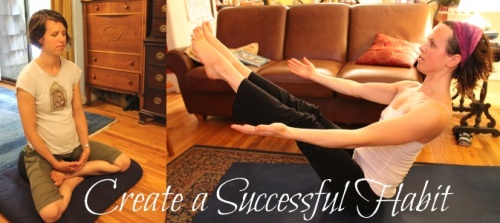Dear reader, you may be new to yoga and mindfulness, or you may have been practicing for a long time now. Regardless, the habit of a daily yoga or meditation practice may seem illusive. It can be so hard to start on your own! That’s a big reason that I do what I do – I want everyone to know the benefits of a daily practice –a ritual that is not necessarily about exercise, but is about connecting to our true selves; connecting mind-body and spirit.
Life is too short to waste in ill-health, stress and distraction, so how do we invite positive practices into our lives? If we want to make a change, it’s important to understand how to make a successful habit.
Why habit?
Much of what we do every day is by habit. Think about it – we don’t think through every move in our morning from making the bed to brushing our teeth. It is an economy of thought and action that we would be in tough shape without. Of course, there is the dark side to habits, in that it can feel near impossible to break a bad one!
The key to creating new habits and converting old ones is to understand how habits work.
Habits always come in a three-part loop. First there is the cue, then the routine (or behavior), then the reward. “The reward is how your brain learns to latch on to this pattern and make it automatic for the future,” says Charles Duhigg, author of The Power of Habit.
So, the key to creating habits, Duhigg says, is to create a cue and reward for your habit.
It’s important to start small. For instance, if you want to start a yoga habit, first spend a week just rolling out your mat every morning. That way, when it comes time to actually do a few sun salutations, it will come with a victorious feeling that becomes an incentive to keep going.
To create a successful meditation habit, set up a peaceful cue, such as a cushion and area to sit. Then, spend a week just sitting on that cushion and taking three deep breaths. Move up slowly in time from there. The reward can be the calm of mindfulness.
“It's known as the science of small wins,” Duhigg says. “We know that if you have this sense of momentum, of victory, it makes the next steps much easier.”
Keystone habits create widespread changes
The beauty of understanding how habits work, is that once we change or create one positive habit, it becomes easier to make other changes. In fact, researchers have found that exercise in particular, is a keystone habit, which means that once people develop the exercise habit, they find it easier to make widespread changes that help them feel better.
For me, exercise, initially running, was the key to understanding that if I didn’t take care of myself, I wasn’t a great contributor the the world. I knew that I needed to have a healthy body to have the energy and mental clarity that allows me to function.
Later I developed my meditation habit. Meditation has given me more peace than any other practice. I came to it through the path of yoga, and perhaps that makes sense – one positive habit helped to trigger another.
What habit would you like to have? Have you tried before? Let us know in the comments below or on my Facebook page!

P. S. Each week I share personal insights only in email. Plus subscriber yoga practices, meditations, and more. Click here to be part of it!

